英语常用情景口语用语
- 格式:doc
- 大小:29.00 KB
- 文档页数:3
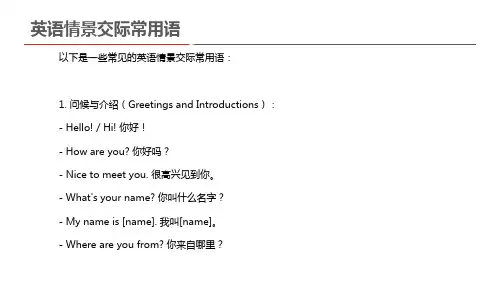
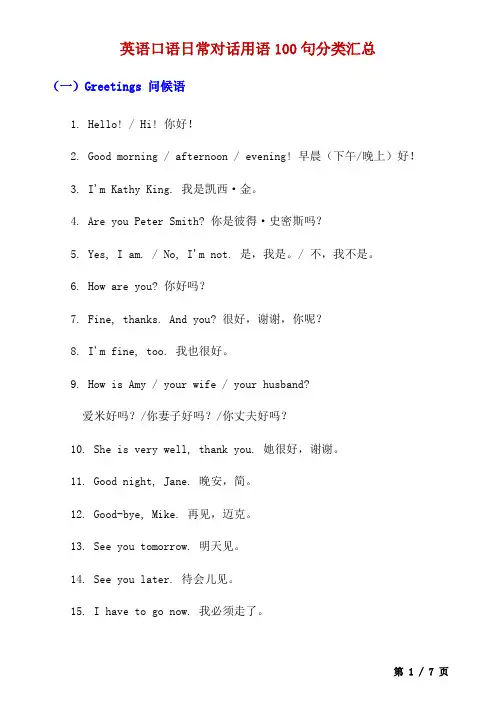
英语口语日常对话用语100句分类汇总(一)Greetings 问候语1. Hello! / Hi! 你好!2. Good morning / afternoon / evening! 早晨(下午/晚上)好!3. I'm Kathy King. 我是凯西·金。
4. Are you Peter Smith? 你是彼得·史密斯吗?5. Yes, I am. / No, I'm not. 是,我是。
/ 不,我不是。
6. How are you? 你好吗?7. Fine, thanks. And you? 很好,谢谢,你呢?8. I'm fine, too. 我也很好。
9. How is Amy / your wife / your husband?爱米好吗?/你妻子好吗?/你丈夫好吗?10. She is very well, thank you. 她很好,谢谢。
11. Good night, Jane. 晚安,简。
12. Good-bye, Mike. 再见,迈克。
13. See you tomorrow. 明天见。
14. See you later. 待会儿见。
15. I have to go now. 我必须走了。
(二)Expression In Class 课堂用语16. May I come in? 我能进来吗?17. Come in, please. 请进。
18. Sit down, please. 请坐。
19. It's time for class. 上课时间到了。
20. Open your books and turn to page 20.打开书,翻到第20页。
21. I'll call the roll before class. 课前我要点名。
22. Here! 到!23. Has everybody got a sheet?每个人都拿到材料了吗?24. Any different opinion? 有不同意见吗?25. Are you with me? 你们跟上我讲的了吗?26. Have I made myself clear? 我讲明白了吗?27. Could you say it again? 你能再说一遍吗?28. Any questions? 有什么问题吗?29. That's all for today. 今天就讲到这里。
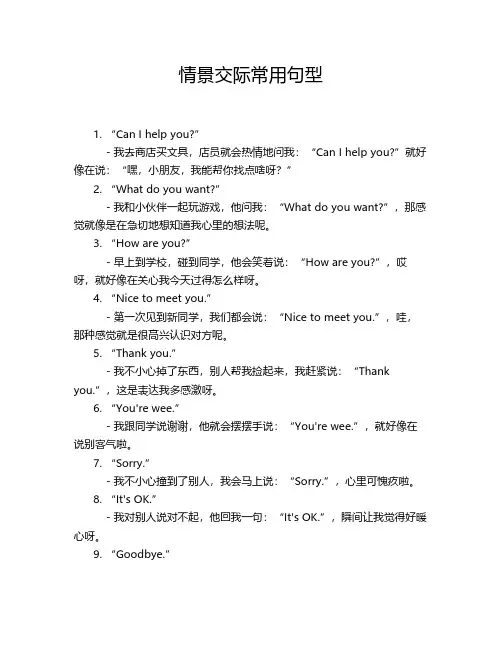
情景交际常用句型
1.“Can I help you?”
-我去商店买文具,店员就会热情地问我:“Can I help you?”就好像在说:“嘿,小朋友,我能帮你找点啥呀?”
2.“What do you want?”
-我和小伙伴一起玩游戏,他问我:“What do you want?”,那感觉就像是在急切地想知道我心里的想法呢。
3.“How are you?”
-早上到学校,碰到同学,他会笑着说:“How are you?”,哎呀,就好像在关心我今天过得怎么样呀。
4.“Nice to meet you.”
-第一次见到新同学,我们都会说:“Nice to meet you.”,哇,那种感觉就是很高兴认识对方呢。
5.“Thank you.”
-我不小心掉了东西,别人帮我捡起来,我赶紧说:“Thank you.”,这是表达我多感激呀。
6.“You're wee.”
-我跟同学说谢谢,他就会摆摆手说:“You're wee.”,就好像在说别客气啦。
7.“Sorry.”
-我不小心撞到了别人,我会马上说:“Sorry.”,心里可愧疚啦。
8.“It's OK.”
-我对别人说对不起,他回我一句:“It's OK.”,瞬间让我觉得好暖心呀。
9.“Goodbye.”
-放学了,和同学们分别时,我们都会说:“Goodbye.”,就像是在说下次再见啦。
10.“See you later.”
-去朋友家玩完要回家了,我会说:“See you later.”,感觉就是期待着下一次见面呢。
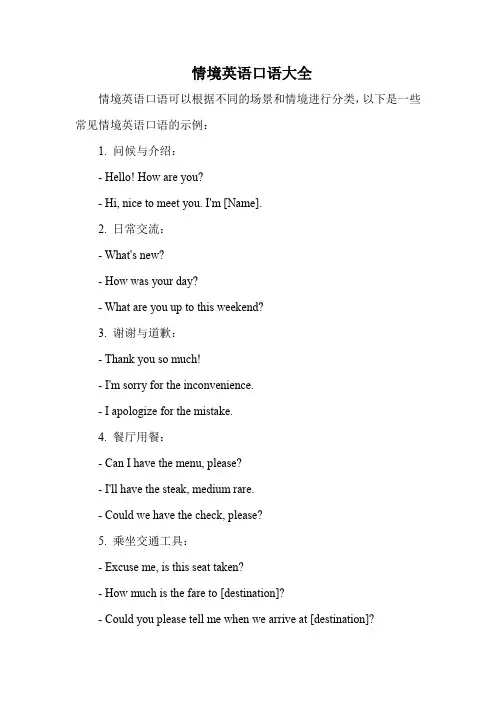
情境英语口语大全情境英语口语可以根据不同的场景和情境进行分类,以下是一些常见情境英语口语的示例:1. 问候与介绍:- Hello! How are you?- Hi, nice to meet you. I'm [Name].2. 日常交流:- What's new?- How was your day?- What are you up to this weekend?3. 谢谢与道歉:- Thank you so much!- I'm sorry for the inconvenience.- I apologize for the mistake.4. 餐厅用餐:- Can I have the menu, please?- I'll have the steak, medium rare.- Could we have the check, please?5. 乘坐交通工具:- Excuse me, is this seat taken?- How much is the fare to [destination]?- Could you please tell me when we arrive at [destination]?6. 购物与付款:- How much does this cost?- Do you accept credit cards?- Can I have a receipt, please?7. 问路与指示:- Excuse me, could you tell me how to get to [location]? - Turn left at the next intersection.- It's just around the corner.8. 紧急情况:- Help! Call the police!- Is there a hospital nearby?- I need assistance, please.。
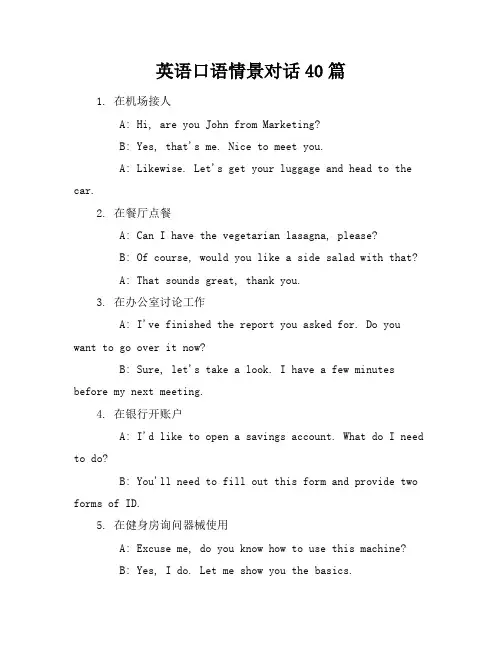
英语口语情景对话40篇1. 在机场接人A: Hi, are you John from Marketing?B: Yes, that's me. Nice to meet you.A: Likewise. Let's get your luggage and head to the car.2. 在餐厅点餐A: Can I have the vegetarian lasagna, please?B: Of course, would you like a side salad with that?A: That sounds great, thank you.3. 在办公室讨论工作A: I've finished the report you asked for. Do you want to go over it now?B: Sure, let's take a look. I have a few minutes before my next meeting.4. 在银行开账户A: I'd like to open a savings account. What do I need to do?B: You'll need to fill out this form and provide two forms of ID.5. 在健身房询问器械使用A: Excuse me, do you know how to use this machine?B: Yes, I do. Let me show you the basics.6. 在超市寻找商品A: Do you know where I can find the peanut butter?B: It's in aisle 3, next to the jelly.7. 在电影院讨论电影A: That movie was intense. What did you think?B: I agree. The plot was really well thought out.8. 在图书馆借书A: Can I check out this book on art history?B: Sure, just show me your library card.A: How's your coffee?B: It's perfect, just the way I like it.10. 在公园散步B: Me too. It's a great place to relax and think.(文档将继续包含其他30个情景对话,每个对话都围绕不同的日常场景,以提供丰富的口语练习材料。
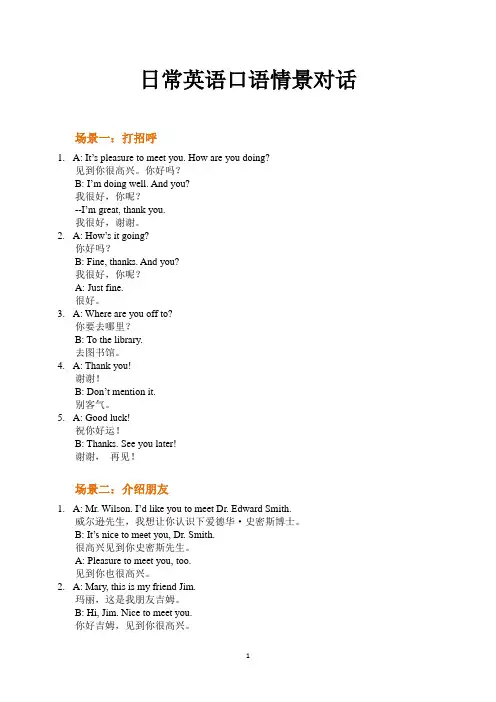
日常英语口语情景对话场景一:打招呼1.A: It’s pleasure to meet you. How are you doing?见到你很高兴。
你好吗?B: I’m doing well. And you?我很好,你呢?--I’m great, thank you.我很好,谢谢。
2.A: How’s it going?你好吗?B: Fine, thanks. And you?我很好,你呢?A: Just fine.很好。
3.A: Where are you off to?你要去哪里?B: To the library.去图书馆。
4.A: Thank you!谢谢!B: Don’t mention it.别客气。
5.A: Good luck!祝你好运!B: Thanks. See you later!谢谢,再见!场景二:介绍朋友1.A: Mr. Wilson. I’d like you to meet Dr. Edward Smith.威尔逊先生,我想让你认识下爱德华·史密斯博士。
B: It’s nice to meet you, Dr. Smi th.很高兴见到你史密斯先生。
A: Pleasure to meet you, too.见到你也很高兴。
2.A: Mary, this is my friend Jim.玛丽,这是我朋友吉姆。
B: Hi, Jim. Nice to meet you.你好吉姆,见到你很高兴。
A: You, too.见到你也很高兴。
B: Would you like a drink?你想喝饮料吗?A: Sure, let’s go get one.好的,我们去买一杯吧。
场景三:询问时间A: What time is it? We’re going to be late!现在几点了?我们要迟到了。
B: It’s a quarter after seven. We’re on time. Don’t panic.现在七点一刻。

Chapter 1 Sociality 社交活动1 Inquiries 询问信息Conversation 1T:Hi,bob. 嗨,鲍勃B:Hi,Tom.How are you doing? 嗨,汤姆。
你好吗?T:Fine,And you? 很好。
你怎么样?B:Great.What’s happening with you these days? 非常好,你最近怎么样?T:Nothing much.I’m just taking one day at a time. 没什么,我只是过一天是一天。
B:That’s OK.Everybody else does,too.See you later. 没关系,大家都是这样。
再会。
Conversation 2M:You have so many stamps. 你的邮票真多。
M1:I began to collect stamps ten years ago. 10年前我就开始集邮了。
M:Would you mind telling me some ways of collecting stamps? 你介意给我讲讲集邮的方法吗?M1:Of course not. 当然不介意。
M:That’s great. 那太好了。
M1:Do you get letters from your friends? 你朋友给你写信吗?M:Yes,I do. 是的。
M1:You can get some stamps from them. 你可以从中获得一些邮票。
M:Any other ideas? 还有什么方法吗?M1:Sometimes it is necessary to buy some new stamps. 有时有必要买一些新的。
M:I See. Thank you for your suggestions. 我知道了,谢谢你的建议。
M1:You are welcome. 不用客气。

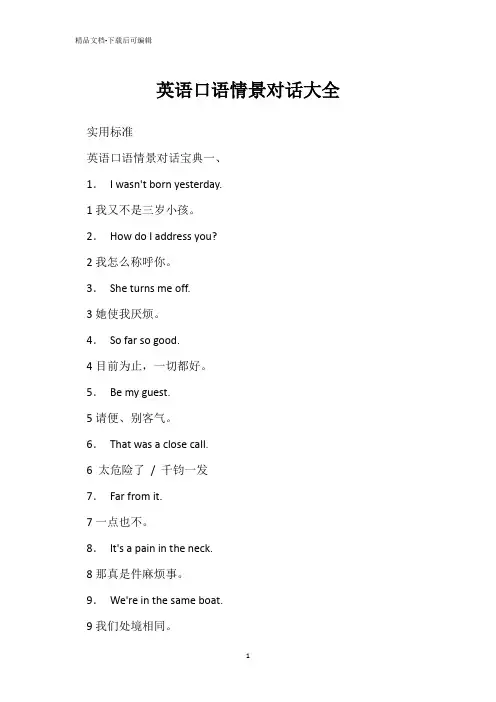
英语口语情景对话大全实用标准英语口语情景对话宝典一、1.I wasn't born yesterday.1我又不是三岁小孩。
2.How do I address you?2我怎么称呼你。
3.She turns me off.3她使我厌烦。
4.So far so good.4目前为止,一切都好。
5.Be my guest.5请便、别客气。
6.That was a close call.6 太危险了/ 千钧一发7.Far from it.7一点也不。
8.It's a pain in the neck.8那真是件麻烦事。
9.We're in the same boat.9我们处境相同。
10.My mouth is watering.10我在流口水了。
11.I ache all over.11我浑身酸痛。
12.I have a runny nose.12我流鼻涕。
13.Do you have any openings? 13你们有空缺吗?14.Think nothing of it.14别放在心上。
15.I'm not myself today.15我今天心神不宁。
16.I have a sweet tooth.16我喜欢吃甜食。
17.For the time being.17暂时;暂且;目前18.Don't beat around the bush. 18别拐弯抹角了。
19.It's up on the air.19悬而未决,尚未确定。
20.It slipped my mind.20我忘了。
21.You can't please everyone. 21你不可能讨好每一个人。
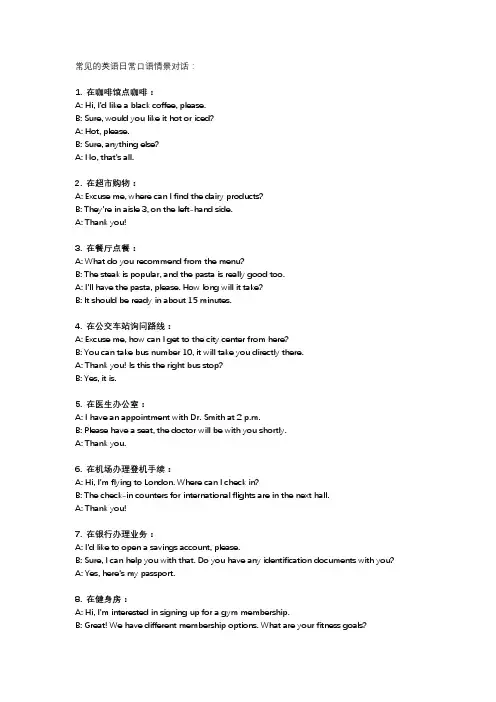
常见的英语日常口语情景对话:1. 在咖啡馆点咖啡:A: Hi, I'd like a black coffee, please.B: Sure, would you like it hot or iced?A: Hot, please.B: Sure, anything else?A: No, that's all.2. 在超市购物:A: Excuse me, where can I find the dairy products?B: They're in aisle 3, on the left-hand side.A: Thank you!3. 在餐厅点餐:A: What do you recommend from the menu?B: The steak is popular, and the pasta is really good too.A: I'll have the pasta, please. How long will it take?B: It should be ready in about 15 minutes.4. 在公交车站询问路线:A: Excuse me, how can I get to the city center from here?B: You can take bus number 10, it will take you directly there.A: Thank you! Is this the right bus stop?B: Yes, it is.5. 在医生办公室:A: I have an appointment with Dr. Smith at 2 p.m.B: Please have a seat, the doctor will be with you shortly.A: Thank you.6. 在机场办理登机手续:A: Hi, I'm flying to London. Where can I check in?B: The check-in counters for international flights are in the next hall.A: Thank you!7. 在银行办理业务:A: I'd like to open a savings account, please.B: Sure, I can help you with that. Do you have any identification documents with you? A: Yes, here's my passport.8. 在健身房:A: Hi, I'm interested in signing up for a gym membership.B: Great! We have different membership options. What are your fitness goals?A: I want to work on strength training and cardio.9. 在旅游中心咨询:A: Can you recommend any must-see attractions in this city?B: Of course! The historical museum and the botanical gardens are highly recommended. A: Thank you! Are they within walking distance?10. 在家庭聚餐中:A: The food you cooked is delicious!B: Thank you, I'm glad you like it. Would you like some more?A: Yes, please. This is really tasty.。
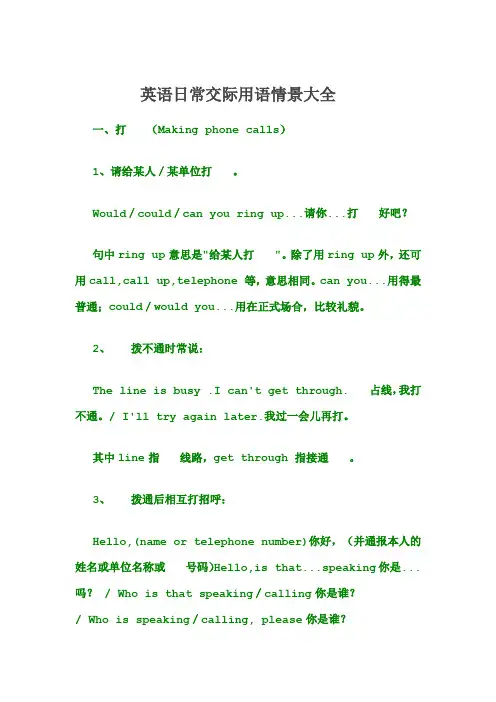
英语日常交际用语情景大全一、打(Making phone calls)1、请给某人/某单位打。
Would/could/can you ring up...请你...打好吧?句中ring up意思是"给某人打 "。
除了用ring up外,还可用call,call up,telephone 等,意思相同。
can you...用得最普通;could/would you...用在正式场合,比较礼貌。
2、拨不通时常说:The line is busy .I can't get through. 占线,我打不通。
/ I'll try again later.我过一会儿再打。
其中line指线路,get through 指接通。
3、拨通后相互打招呼:Hello,(name or telephone number)你好,(并通报本人的姓名或单位名称或号码)Hello,is that...speaking你是...吗? / Who is that speaking/calling你是谁?/ Who is speaking/calling, please你是谁?应答时常说:Yes,(this is)...speaking.是的,我是...。
/ Yes,it's...here. 我是...。
4、打请对方找人或留言:Is...in/at home 某某在家吗?/ Can/may/could I speak to...,please请...接好吗?/ Will/would you give a message to...,please请给...捎个口信好吗? / Would you tell him my telephone number, plea se 请你把我的号码告诉他好吗?/ Can/could you ask...to ring me back, please请叫...给我回个好吗?应答时常说:Hold on/Wait a minute/One moment, please. 请等一等。
英语口语情景对话大全英语口语是我们日常生活和工作中必不可少的一部分。
无论是在旅行、工作、社交聚会还是商务谈判中,良好的口语能力都能帮助我们更好地沟通和交流。
下面是一些常见情景对话,希望能给大家提供一些指导和帮助。
1. 旅行情景对话:A: Excuse me, could you please tell me how to get to the nearest train station?B: Sure, just go straight ahead and turn left at the second intersection. You'll see it on your right.A: Thank you so much!2. 饭店情景对话:A: Good evening, do you have a reservation?B: Yes, under the name of Smith.A: Perfect, your table is ready. Please follow me.3. 购物情景对话:A: Can I help you find anything?B: I'm looking for a pair of running shoes in size 9.A: We have various options. Would you like to try them on?4. 社交聚会情景对话:A: Hi, nice to meet you! I'm Emma.B: Hi Emma, I'm Mark. How do you know the host?A: We used to work together. What about you?5. 商务谈判情景对话:A: We're interested in purchasing your products for our company. Can you provide a quote?B: Of course. Could you please let me know the quantity you require?A: We're looking to place an initial order of 500 units.以上只是一些常见情景的对话示例。
英语场景用语在现代社交交流中,英语是一种普遍使用的语言,学会使用一些场景用语可以帮助我们更好地与他人进行交流。
以下是一些常见的英语场景用语。
1. 在机场:- 问候和告别:- Hello! Are you traveling alone?- Goodbye! Have a safe trip!- 询问信息:- Excuse me, where is the baggage claim area?- Can you tell me where the nearest restroom is?- 预订机票:- I would like to book a flight to New York, please.- What time does the next flight to London depart?2. 在餐厅:- 预订座位:- Hi, I would like to make a reservation for two at 7 pm.- Do you have any vegetarian options?- 点餐:- Can I have the menu, please?- I would like to order the chicken salad, please.- 付款:- Can I have the bill, please?- Can I pay with credit card?3. 在酒店:- 预订房间:- Good morning! I would like to book a room for two nights. - Do you have any available rooms?- 办理入住:- Hi, I have a reservation under the name of John Smith.- Could you please give me the key to my room?- 询问服务:- Is there a gym or a swimming pool in the hotel?- Can I request a wake-up call for 7 am?4. 在商店:- 寻找商品:- Excuse me, where can I find the women's clothing section? - Do you have this item in a different color?- 试穿和购买:- Can I try this on, please?- I would like to buy this shirt in size small.- 询问价格和折扣:- How much does this cost?- Is there a discount on this item?5. 在医院:- 预约看病:- Hi, I would like to make an appointment to see a doctor.- When is the earliest appointment available?- 描述症状:- I have been experiencing a fever and a sore throat.- My stomach has been hurting for the past few days.- 药物和治疗:- What medication do you recommend for my symptoms?- Do I need to come back for a follow-up appointment?以上是一些常见的英语场景用语。
这篇英语⼝语20个主题情景对话,是⽆忧考特地为⼤家整理的,希望对⼤家有所帮助!相貌 A: That girl looks very attractive, doesn’t she? B: do you think so? I don’t like girls who look like that. I like girls who aren’t too slim. If you like her, go and talk to her. A: I’d like to, but there’s her boyfriend. He’s very broad-shouldered. B: he’s huge! He must go to the gym to have a well-built body like that. A: do you prefer tall girls or short ones? B: I don’t mind, but I like girls with long hair. A: we have different tastes. I like girls with short hair. I like tall girls- probably because I’m so tall myself. B: have you ever dated a girl taller than you? A: no, never. I don’t think I’ve ever met a girl taller than me! Have you gained weight recently? B: yes, I have. Perhaps I should go to the gym, like that girl’s boyfriend. A: I ‘m getting a bit plump myself. Perhaps I’ll go with you. ⾝体部分 A: I’m going to the beauty parlor. Do you want to come too? B: sure. Let’s go. What are you going to have done? A: I want to have a foot massage and haircut. B: a foot massage sounds like a great idea. They are very relaxing. I’d also like to have a mudpack on my face. It’s supposed to help with your complexion. A: good idea. We should also pedicures and manicures. B: this could become a very expensive trip to be beauty parlour! A: I think it’s a good idea to pamper yourself occasionally. Don’t you agree? B: oh, I agree. We both work hard and a little beauty treatment can relieve stress. A: maybe we should try a thai massage too. B: what’s special about a thai massage? A: that’s when the masseuse walk on your back and massage you with her feet. B: sounds painful! ⾝体部位的运动 A: when you are in a restaurant you want the waiter to bring the bill, what do you do to attract his attention? B: I just make eye contact with him and nod my head. Then I tell him when he comes over to the table. Why do you ask? A: I went out with my girlfriend to a nice restaurant last night and I noticed that many people shouted for the bill. B: that seems a little impolite in such a restaurant. A: that’s what I thought. I just thought I’d ask you and see what you thought of it. Anyway, what did you do yesterday evening? B: well, it was a warm evening, so I stretched my legs. I walked along the canal for a couple of miles. Actually, several other people had the same idea. I saw bill. A: did you? How is he these days? B: he seemed ok. We didn’t stop and chat because we were on opposite banks of the canal. We just waved at each other. A: I need to move some furniture. Could you help me to lift is? B: of course. What do you want to move first? A: let’s move the sofa. Can you get a grip on the bottom at that end? I’ll lift this end. I want to move it sideways in that directon. 家庭 A: who is cindy’s husband? B: cindy’s husband is ron. A: how many children do cindy and ron have? B: they have two children-one son and one daughter-as well as one daughter-in-law and one son-in-law. A: do they have any grandchildren? B: yes, they have three grandchildren-one girl and two boys. A; does their daughters get along well with her in-laws? B: yes, she gets along with them quite well. A: do they have a large family? B: their family is very similar to cindy and ron’s family. 年龄 A: how old is Keith? B: he’s 21. how old is James? A: he’s a year older than Keith, but he looks younger. B: how’s your father? A: he’s fine. He retired last week. It’s turning poing in his life. Now he can relax and enjoy his retirement. B: he can spend more time with his grandchilder. A: oh, I don’t think he wants to. He wants to travel to several different countries around the world. B: so, he wants to have a more active retirement. Good idea! A: how do you want to spend your old age? B: in the same way, probably. 性格 A: do you like Barry? B: no, not very much. He’s too ambitious and dishonest. A: I agree. I like his brother, Paul. They are not alike. B: yes. They are completely different. Paul is very sociable and much more honest than his brother. A: what kind of person do you consider yourself to be? B: I think I’m polite, careful, relaxed and shy. A: oh, I don’t think you’re shy! You are always chatting with new people when we go to a party. B: well, yes, but those people always start talking to me. I never talk to them first. Perhaps I’m not as shy as I think. Anyway, you’re certainly not shy! A: You’re right. I love going out and making new friends. B: so, you’ll be at my birthday party on Friday? A: Of course! 婚姻与约会 A: how are you wedding plans going. B: very well. We started organizing everything early to avoid a last minute rush to get things done. The only thing that isn’t ready yet is my wedding dress. A: when will that be ready? B: the dressmakers said that is would be ready in two weeks. A: you’re getting married in three weeks. So that should be ok. So, you’ve prepared the church, catering, transport, hotel-everything. B: yes. We’ve taken care of all of that. We decided not to get married in a church though. Neither of us is very religious. A: which hotel will the reception be held at? B: the palace hotel they’re taking care of the catering, including the wedding cake. I’m sure they’ll do a good job. A; oh, yes. It’s and excellent hotel. A friend of mine had her wedding reception there and said it was perfect, though very expensive. B: yes. It will be expensive, but we think it will be worth. It gives us great peace of mind to know that our reception is in the hands of experienced people. A; I think you make the right decision. 朋友 A: I had a big argument with david yesterday. I hope he’s not still mad at me. B: what did you argue about? A: he borrowed some money from me and I needed it back. He said he didn’t have the money yet. B: well, he should pay out back. It’s only fair. A: yes, but is got angry with him too quickly. He probably thought that I mistrusted him. I shouldn’t have got angry. B; did you lend him a lot of money? A; not much. I had to pay an unexpected bill, so I needed the money back. B; well, talk to him about it next time you see him. He probably feels as bad about it as you do. Close friends sometimes have disagreements. It’s nothing unusual. Neither of you said anything really nasty, did you? A: no , we didn’t. I guess you’re right. We should patch things up. B: of course you should. You wouldn’t want a silly argument to ruin a long friendship, would you? 聚会 A: are you going to helen’s birthday party on Friday evening? B: I wouldn’t miss it for the world! It’s sure to be fun. She’s invited a lot of people. Do you thind everyone will be able to get into her house? A: if everyone turned up, it would be a squeeze, but a feww people said that they couldn’t go, so I think it should be ok? B: are you taking anything? A: I’ve got her a birthday present and I’ll take a bottle fo wine too. B: that’s a good idea. She told she had bought plenty of food and snacks. I think it’s going to be a noisy party. I hope her neihbours don’t mind too much. A: helen gets on very well with her neighours. I wouldn’t be surprised if they went to the party too. B: I’m ready looking forward to it. This party is going to be a blast! A: well, don’t be late. I’ll see you on Friday at helen’s. 住宅与公寓 a: what kind of place shall we rent? b:it should be close to the universtity. neither of us are good at getting up in the morinings and closer it is, the later we can get up. a:asolutely. that's the most important thing to take into consideration. i'm not too worried about the size of the flat. b: neither am i. so a small place is ok, but we'll get a bigger one if it's not expensive. do you mind if it's in a noisy area. a:i don't mind. i'm not a light sleeper, but quieter is better for when we have to study at home. b: good point. ok, let's go to the estate agent and see what they can offer us. a: yes, if we're lucky we'll find something in the next few days. i think you had a good idea to start flat hunting early. b: how much do you think the rent will be? a: i asked a few people who are already living in places near the university and they said it would cost about one hundred pounds a month. 住宅与公寓 A: I like this apartment. Do you think we can afford the mortgage? B: yes. I think so. It’s not a very expensive apartment. It’s in the right area and it has everything that we are looking for. The rooms are quite large too. A: I love the balcony. We can sit outside and enjoy the sun in summer. We are on the 12th floor, so there’s very nice view from the balcony. B: the neighbourhood is nice too. There is a park nearby. A: yes, and there are many houses nearby. I like it that the neighbourhood isn’t full of apartment blocks. B: it’s a pity we can’t afford a house. A garden would be so nice. A: yes, it would. Don’t worry. There’s a lawn outside the building and there’s the park nearby. This place will be fine. B: the building is quite new and well constructed. I’m happy with the fittings too. A: yes, everything has been well designed. 起居室 A: good morning. I’m thinking about buying some new furniture for my living room. Could you help me? B: certainly. As you can see, we have several three-piece suites on sale. Feel free to sit down and test how comfortable they are. A: I came to your store yesterday and have come back today to make a final decision. I think I like the black leather suite. It’s on a real bargain. B: yes. The price has been reduced by 50%. It’s a real bargai n . / p > p b d s f i d = " 1 7 4 " > 0 0 A : I l l t a k e i t . I a l s o n e e d t o i m p r o v e t h e l i g h t i n g i n m y l i v i n g r o o m . D o y o u h a v e a n y s u g g e s t i o n s ? / p > p b d s f i d = "1 7 5 " > 0 0 B : t h o s e f l o o r l a m p s a r e v e r y n i c e a n d y o u c a n v a r y t h e b r i g h t n e s s a c c o r d i n g t o w he t h e r y o u r e r e a d i n g o r w a t c h i n g t v . H o w b i g i s y o u r l i v i n g r o o m ? / p > p b d sf i d = " 1 7 6 " > 0 0 A : i t s q u i t e l a rg e . I t s a b o u t 4 0 s q u a r e m e t r e s . / p > p b d s f i d = " 1 7 7 " > 0 0 B : I d s u g g e s t y o u b u y t w o . Th a t a l l o w s y o u t o c h a n g e t h e b ri g h t n e s s o f t h e r o o m b e t t e r . / p >。
英语日常情景口语对话常用短语英语日常情景口语对话常用短语短语是英语常用语之一,尤其是在英语日常的情景对话里,短语的掌握很重要。
下面是店铺为大家整理的一些英语日常情景口语对话常用短语,希望大家喜欢。
1. get acquainted (with...)(和`……)认识,熟悉……这个常用的.短语暗示双方从不认识到熟识,“get”可换“become”。
若是短语之后,要加上被认识的对象,以介系词“with”连接。
例:Our boss got acquainted with a couple of real estate agents in the golf Club.(我们老板在高尔夫俱乐部里结识了几位做房地产的商人。
)2. on top of things 完全掌握字面的意思是将问题克服,高高踩在上面,引申为“控制全局”。
例:The new manager was always worried he wasn’t on top of things.(新经理一直担心自己无法掌握全局。
)3. (a) force to be reckoned with 值得注意的人物“(a) force”,“力量”,可以指一个团体、事物或个人;“reckon”在此的意思为“认定”。
“a force to be reckoned with”是形容“有成功的条件而值得注意的人物、团体”。
例:The new company will be a force to be reckoned with in the future.(这家新公司未来值得大家注意。
)4. Don't I know it. 我完全同意!当此句型以句点(.)而非问号结尾时,表示完全同意对的方意见,为口语用法,强调的是肯定的含意。
意思为”我怎会不知道!?;我当然明白这一点!”。
例:You say the discount rate is too low? Don't I know it!(你说这折扣打得太少?我完全同意!)5. in a nutshell 简言之“nutshell”原为“坚果壳”,又指“极小的容器”,故“in a nutshell” 这个副词短语的意思是“简言之”。
英语口语情景对话一、祝愿、祝贺和应答 ( Good wishes, congratulations and responses )1.- Well done and congratulations to you.- Thanks very much.2.- I hope you ‘ll succeed in everything.- So do I.3.- I wish you success.- Thank you.4.- We send you our best wishes.- Thank you very much.5.- Happy new year !- Happy new year! (The same to you.)6.- A merry Christmas to you.- Thank you.7.- I hope you ‘ll have a good time.- Thank you.8.- Happy birthday!- Thank you.二、邀请和应答 ( Invitations and responses )1.- Would you like to come to the party?- Oh yes, thank you.2.- I hope you can come to the dance next Saturday.- I‘m sorry, but I can ‘t.3.- Will you go dancing with us?- Of course. I ‘ll be glad to.4.- Will you come to our English Evening?- Yes, thank you.5.- Would you please give us a talk on English Learning?- OK. When?6.- You and your friends must come over to my house and see mooncakes.- OK. Thank you very much.三、表示同意和不同意 ( Expressing agreement and disagreement )1.- I think the shop is closed at this time of day.- No, I think it ‘s open.2.- I think foreign languages are more interesting than science.- I really can ‘t agree with you. I prefer science.3.- I think I shall read a book instead.- Good idea. That ‘s much better than watching a bad TV Programme.4.- I don‘t think that it ‘s true. He ‘s always telling strange stories. - I know. But this time I can ‘t decide if he is right or not.5.- I think Chinese is more popular than any other subject.- Maybe. But I prefer art.6.- Don‘t think in Chinese when you ‘re speaking English.- You are quite right.四、道歉和应答 ( Apologies and responses )1.- Sorry to trouble you.- That‘s all right.2.- Oh, I am so sorry.- That‘s quite all right.3.- I‘m sorry to give you so much trouble.- No trouble at all.4.- I‘m soory. I lost the key to your bike.- It doesn ‘t matter.5.- Sorry to have kept you waiting for a long time.- It doesn ‘t matter.6.- You haven ‘t paid for it yet.- Oh, I‘m really very sorry.五、劝告和建议 ( Advice and suggestions )1.- The park isn ‘t far from here. Shall we walk there?- OK.2.- You‘d better close the windows. It ‘s cold in the room.- All right.3.- If you are not better by then, I ‘ll take you to see the doctor. - OK. Thank you very much.4.- You must look after yourself and keep healthy.- Yes, I will. Thanks.5.- The museum is very far from here. Let ‘catch a bus, shall we? - OK. Let‘s catch a bus.6.- You must remember the saying: Whatever you do, do it well. - Thank you for your advice.六、打电话 ( Making telephone calls )1.- Hello!- Hello, Bill?- No, this is Sam.- Hi, Sam. This is Mike. How are you?2.- Hello.- Hello. May I speak to Mr Green?3.- No. 5 Middle School.- Mr Green, please.- I‘m sorry. Mr Green is not in.- When will he be back?- About six this afternoon.- All right. I ‘ll ring again then.- Very well.4.- Hello!- Hello, Ham Mei. Could I borrow your Chinese-English Dictionary please?- Sorry! It‘s not a very good line. Could you speak more loudly? - Could I borrow your Chinese-English dictionary?- Sure. I‘ll bring it to you tomorrow.- Thank you. Goodbye.七、请求允许和应答 (Asking for permission and responses )1.- Please let me help you.- No, thanks. I can carry it.2.- Can I see your licence, please?- OK.3.- May I call you James?- Of course, if you wish.4.- Could I borrow a pen, please?- Of course. With pleasure.5.- Excuse me. May I use your dictionary?- Yes, here you are.6.- May I ask you several questions?- Yes, of course.八、提供… 和应答 ( Offers and responses )1.- May I help you?- Oh yes, thank you.2.- Let me help you with the bags.- Well, I can manage all right. Thanks just the same. 3.- Can we help you?- I want to go to hospital. But I can ‘t. My leg hurts. 4.- Must I clean the classroom now?- Oh, you needn ‘t.5.- Would you like a cup of tea?- Yes, please.6.- What can I do for you?- I‘d like to have an English-English dictionary.九、问路和应答 (Asking the way and responses )1.- Excuse me. Where is the washroom, please?- Oh, it‘s over there.2.- Excuse me. Can you tell me where the bookshop is? - Look! It‘s on the other side of the road.3.- How far is the post office, please?- Only a few kilometers.4.- Will you please tell me the way to the railway station?- Go down this street. At the end of the road you ‘ll see it.5.- Excuse me. Could you tell me how I can get to the supermarket?- Go straight along this road. Then go over the bridge and turn right at the bookshop. You ‘ll find it.十、购物 ( Shopping )1.- What can I do for you?- I‘d like some apples.2.- Where can I buy some stationery?- Let‘s look at the shopping guide. Oh, it ‘s on the ground Floor. 3.- Could I buy half a kilo oranges?- Certainly. Here you are.4.- Will you please show me that radio?- Certainly.5.- How much is the radio?- Ninety yuan.6.- Good morning, sir. May I help you?- Yes, I‘d like to buy a sweather.十一、谈论天气 (Talking about the weather )1.- It‘s a fine day for a walk.- Yes, the air is nice and clean.2.- Oh dear! It ‘s very cold today.- Yes, you need to wear warmer clothes.3.- What‘s the weather like today?- It‘s fine.4.- What‘s the weather like in your country now?- It‘s very hot.5.- Lovely weather, isn ‘t i t?- Yes, isn‘t it?6.- I missed the weather report this morning. Did you hear it?- Y es. It said partly cloudy today, with a strongwind from The northwest.十二、时间或日期和应答 (Asking the time or date and responses ) 1.- Hi, Mary. What time is it now?- It‘s about three.2.- What day is it today?- It‘s Wednesday.3.- Excuse me. Could you tell me what time the plane leaves?- Certainly. It leaves at ten in the evening.4.- What‘s the time? My watch has stopped.- Let me see. It ‘s five to ten.5.- Excuse me. Have you got the time?- Yes, it‘s six twenty.6.- Excuse me. Could you tell me the time?- Oh sorry, I don ‘t have my wat ch with me.十三、约会 ( Making appointments )1.- Are you free next Wednesday evening? I want to go to the cinema with you?- Yes, I‘d like to.2.- When shall we meet, this evening or tomorrow evening?- I don‘t mind. Either time is OK.3.- Are you free later today?- Sorry, I‘m free every day except today.4.- Are you able to come tomorrow morning?- I think so.5.- Are you free this afternoon?- Oh no. Will this evening be all right?6.- I‘m busy today. What about tomorrow afternoon?- That would be fine. Shall we make it nine o ‘clock?十四、禁止和警告 ( Prohibition and warnings )1.- Don‘t climb tha t ladder! It ‘s broken.- OK. Thank you.2.- Look out! There ‘s a car coming.- Oh, thank you.3.- You mustn ‘t play on the street. It ‘s dangerous.- No, we won ‘t.4.- Don‘t touch the machine when it is working.- No, I won ‘t. Thank you.5.- You are not allowed to smoke here.- Oh, I‘m sorry.6.- You can ‘t walk your dog in the park.- Oh, I‘m sorry. I‘ll never do it again.十五、看病 ( Seeing the doctor )1.- I‘m feeling tired, doctor.- Have a good rest and then you ‘ll feel better.2.- How are you feeling today?- I‘m feeling even worse.3.- Doctor, she is not feeling well.- Nothing serious, I hope.4.- Doctor, do I have to take the medicine before or after meals? - Three times a day after meals.5.- What‘s the matter?- I‘ve got a headache.6.- What‘s your trouble?- I‘ve had a pain in my stomach since morning.十六、语言困难( XXIX. Language difficulties )1.- I don‘t quite follow you, Mr Green. Will you please say it again? - OK.2.- Do you follow what I ‘m saying?- Sorry, I can ‘t follow you.3.- I beg your pardon. Will you say it again?- All right.4.- Will you say it again more slowly? I can ‘t follow you.- OK.5.- Will you please repeat what you ‘ve just said?- OK. I‘ll repeat what I have said.6.- I‘m sorry, I don ‘t understand French. Do you speak English? - Yes, I do.。
英语口语日常情景对话用语发布:2007-6-11 9:16:00来自:朝阳都市网字体:[ 大中小]一、祝愿、祝贺和应答(Good wishes, congratulations and responses)1.- Well done and congratulations to you.- Thanks very much.2.- I hope you‘ll succeed in everything.- So do I.3.- I wish you success.- Thank you.4.- We send you our best wishes.- Thank you very much.5.- Happy new year !- Happy new year! (The same to you.)6.- A merry Christmas to you.- Thank you.7.- I hope you‘ll have a good time.- Thank you.8.- Happy birthday!- Thank you.二、邀请和应答(Invitations and responses)1.- Would you like to come to the party?- Oh yes, thank you.2.- I hope you can come to the dance next Saturday.- I‘m sorry, but I can‘t.3.- Will you go dancing with us?- Of course. I‘ll be glad to.4.- Will you come to our English Evening?- Yes, thank you.5.- Would you please give us a talk on English Learning?- OK. When?6.- You and your friends must come over to my house and see mooncakes.- OK. Thank you very much.三、表示同意和不同意(Expressing agreement and disagreement)1.- I think the shop is closed at this time of day.- No, I think it‘s open.2.- I think foreign languages are more interesting than science.- I really can‘t agree with you. I prefer science.3.- I think I shall read a book instead.- Good idea. That‘s much better than watching a bad TV Programme.4.- I don‘t think that it‘s true. He‘s always telling strange stories.- I know. But this time I can‘t decide if he is right or not.5.- I think Chinese is more popular than any other subject.- Maybe. But I prefer art.6.- Don‘t think in Chinese when you‘re speaking English.- You are quite right.四、道歉和应答(Apologies and responses)1.- Sorry to trouble you.- That‘s all right.2.- Oh, I am so sorry.- That‘s quite all right.3.- I‘m sorry to give you so much trouble.- No trouble at all.4.- I‘m soory. I lost the key to your bike.- It doesn‘t matter.5.- Sorry to have kept you waiting for a long time.- It doesn‘t matter.6.- You haven‘t paid for it yet.- Oh, I‘m really very sorry.五、劝告和建议(Advice and suggestions)1.- The park isn‘t far from here. Shall we walk there?- OK.2.- You‘d better close the windows. It‘s cold in the room.- All right.3.- If you are not better by then, I‘ll take you to see the doctor. - OK. Thank you very much.4.- You must look after yourself and keep healthy.- Yes, I will. Thanks.5.- The museum is very far from here. Let‘catch a bus, shall we? - OK. Let‘s catch a bus.6.- You must remember the saying: Whatever you do, do it well. - Thank you for your advice.六、打电话(Making telephone calls)1.- Hello!- Hello, Bill?- No, this is Sam.- Hi, Sam. This is Mike. How are you?2.- Hello.- Hello. May I speak to Mr Green?3.- No. 5 Middle School.- Mr Green, please.- I‘m sorry. Mr Green is not in.- When will he be back?- About six this afternoon.- All right. I‘ll ring again then.- Very well.4.- Hello!- Hello, Ham Mei. Could I borrow your Chinese-English Dictionary please? - Sorry! It‘s not a very good line. Could you speak more loudly?- Could I borrow your Chinese-English dictionary?- Sure. I‘ll bring it to you tomorrow.- Thank you. Goodbye.七、请求允许和应答(Asking for permission and responses)1.- Please let me help you.- No, thanks. I can carry it.2.- Can I see your licence, please?- OK.3.- May I call you James?- Of course, if you wish.4.- Could I borrow a pen, please?- Of course. With pleasure.5.- Excuse me. May I use your dictionary?- Yes, here you are.6.- May I ask you several questions?- Yes, of course.八、提供… 和应答(Offers and responses)1.- May I help you?- Oh yes, thank you.2.- Let me help you with the bags.- Well, I can manage all right. Thanks just the same.3.- Can we help you?- I want to go to hospital. But I can‘t. My leg hurts.4.- Must I clean the classroom now?- Oh, you needn‘t.5.- Would you like a cup of tea?- Yes, please.6.- What can I do for you?- I‘d like to have an English-English dictionary.九、问路和应答(Asking the way and responses)1.- Excuse me. Where is the washroom, please?- Oh, it‘s over there.2.- Excuse me. Can you tell me where the bookshop is? - Look! It‘s on the other side of the road.3.- How far is the post office, please?- Only a few kilometers.4.- Will you please tell me the way to the railway station? - Go down this street. At the end of the road you‘ll see it.5.- Excuse me. Could you tell me how I can get to the supermarket?- Go straight along this road. Then go over the bridge and turn right at the bookshop. You‘ll find it.十、购物(Shopping)1.- What can I do for you?- I‘d like some apples.2.- Where can I buy some stationery?- Let‘s look at the shopping guide. Oh, it‘s on the ground Floor.3.- Could I buy half a kilo oranges?- Certainly. Here you are.4.- Will you please show me that radio?- Certainly.5.- How much is the radio?- Ninety yuan.6.- Good morning, sir. May I help you?- Yes, I‘d like to buy a sweather.十一、谈论天气(Talking about the weather)1.- It‘s a fine day for a walk.- Yes, the air is nice and clean.2.- Oh dear! It‘s very cold today.- Yes, you need to wear warmer clothes.3.- What‘s the weather like today?- It‘s fine.4.- What‘s the weather like in your country now?- It‘s very hot.5.- Lovely weather, isn‘t it?- Yes, isn‘t it?6.- I missed the weather report this morning. Did you hear it?- Yes. It said partly cloudy today, with a strong wind from The northwest.十二、时间或日期和应答(Asking the time or date and responses)1.- Hi, Mary. What time is it now?- It‘s about three.2.- What day is it today?- It‘s Wednesday.3.- Excuse me. Could you tell me what time the plane leaves?- Certainly. It leaves at ten in the evening.4.- What‘s the time? My watch has stopped.- Let me see. It‘s five to ten.5.- Excuse me. Have you got the time?- Yes, it‘s six twenty.6.- Excuse me. Could you tell me the time?- Oh sorry, I don‘t have my watch with me.十三、约会(Making appointments)1.- Are you free next Wednesday evening? I want to go to the cinema with you? - Yes, I‘d like to.2.- When shall we meet, this evening or tomorrow evening?- I don‘t mind. Either time is OK.3.- Are you free later today?- Sorry, I‘m free every day except today.4.- Are you able to come tomorrow morning?- I think so.5.- Are you free this afternoon?- Oh no. Will this evening be all right?6.- I‘m busy today. What about tomorrow afternoon?- That would be fine. Shall we make it nine o‘clock?十四、禁止和警告(Prohibition and warnings)1.- Don‘t climb that ladder! It‘s broken.- OK. Thank you.2.- Look ou t! There‘s a car coming.- Oh, thank you.3.- You mustn‘t play on the street. It‘s dangerous.- No, we won‘t.4.- Don‘t touch the machine when it is working.- No, I won‘t. Thank you.5.- You are not allowed to smoke here.- Oh, I‘m sorry.6.- You can‘t walk your dog in the park.- Oh, I‘m sorry. I‘ll never do it again.十五、看病(Seeing the doctor)1.- I‘m feeling tired, doctor.- Have a good rest and then you‘ll feel better.2.- How are you feeling today?- I‘m feeling even worse.3.- Doctor, she is not feeling well.- Nothing serious, I hope.4.- Doctor, do I have to take the medicine before or after meals? - Three times a day after meals.5.- What‘s the matter?- I‘ve got a headache.6.- What‘s your trouble?- I‘ve had a pain in my stom ach since morning.十六、语言困难(XXIX. Language difficulties)1.- I don‘t quite follow you, Mr Green. Will you please say it again? - OK.2.- Do you follow what I‘m saying?- Sorry, I can‘t follow you.3.- I beg your pardon. Will you say it again?- All right.4.- Will you say it again more slowly? I can‘t follow you.- OK.5.- Will you please repeat what you‘ve just said?- OK. I‘ll repeat what I have said.6.- I‘m sorry, I don‘t understand French. Do you speak English?- Yes, I do.。
英语常用情景口语用语
国家基础教育英语课程标准将英语课程的总体目标确定为学生综合语言运用能力的形成,而这一能力的形成是建立在学生的语言技能、语言知识、情感态度、学习策略和文化意识等素养的整合发展的基础之上的。
这一目标的确定,将英语课程从仅仅关注知识与技能的培养提高到对学生整体素质的培养,使学生既有较强的英语语言运用的能力,又有自主学习能力和良好的个性品格,从而为终身学习和发展打下良好的基础。
《标准》以描述学生“能做什么”为主线,强调学生要能用所学的英语做事情,在做事情的过程中发展语言能力、思维能力以及交流与合作的能力。
语言学习要从语法讲解中和单词的死记硬背中解脱出来,要通过创设良好的语言环境和提供大量的语言实践的机会,使学生通过自己的体验、感知、实践、参与和交流,形成语感;在教师的引导下,通过观察、发现和归纳等方式,掌握语言的规律,形成有效的学习策略,通过交流与合作发展交流与合作的能力。
现行中山的英语教材《Friends with English》要求小学五、六年级的学生具备初步的写作能力。
写是书面表达和一种传递信息的交际能力,是小学英语学习中的重点,也是一个难点。
在《新课标》环境下,如何在起步阶段抓好学生的写作水平、培养并提高他们的写作能力值得我们不断探索和总结。
一、通过点、线结合教学,培养学生正确运用句子的能力。
任何语言都有内在联系。
英语也不例外,这种联系无非就是:词—词组—句子。
许多学生无从下笔,其根本原因之一就是词汇贫乏,词组不认识,句子不会译。
要攻克这一难点,教师一方面要加强对学生记单词的督促和检查,另一方面要提高单词教学的主动性、灵活性、趣味性。
激发起学生想学,想记的欲望。
如,颜色单词“green”、“brown”分别是“绿色”、“棕色”的意思,而大写“Green”、“Brown”则是姓氏“格林”、“布朗”的意思。
我还指导学生每见到一个单词,从词性、近义词、反义词、相关词组等方面找一找与其有联系的词或句。
这样不但拓展了词义,更重要的是增加了学单词、背单词的兴趣。
如,go “去”这个单词,是动词。
反义词是come。
相关的词组常用的有:go home , go to school , go to bed , go to sleep ,go on ,ect.词组增加了单词的内涵,增加了语言表达的生动性。
如何才能把词、词组正确且恰到好处地运用到句子中呢?
二、注意英汉差异,使用正确的英语表达法。
许多学生写英文短文,都习惯用汉语去思考。
写出来的句子,读起来很拗口,句意生硬,令人费解。
甚至有的学生将汉语句子逐一对照译成英语单词,拼凑成句子。
如,句子:上个星期天,我爸爸坐船去了上海。
译文成了:Last Sunday ,I father sit ship go to Shanghai. 令人啼笑皆非。
究其原因是学生不明白英汉两种语言表达上的差异。
如,汉语中没有时态和语态的复杂变化,只借助于助词“着,了,过”。
而英语则有复杂的时态和语态变化。
词——词组——句子,这三点由于时态和语态,而不能成为一线。
再如,英语中名词分(1)可数名词——单数名词——复数名词——规则名词复数的变化;不规则名词复数的
变化(2)不可数名词:water ,furniture , advice (3)名词单复数相同:sheep , deer , fish (4)既能可数又不可数的名词:hair , wood , paper , rain , sand 。
动词短语,介词短语等一些固定搭配,动词与其主语的一致,称谓的一致,等等。
这些差异只要通过不断的积累,才能在实际运用中应用地恰到好处。
英语写作才能更规范,更标准,更符合英美人的表达习惯。
三、运用适当的训练方法。
(1)写作和任何形式的知识一样都是可以通过训练加以提高的。
基础知识和能力并重,听、说、读和写并举。
教师在平时教学中应充分利用一切可以利用的机会启发、引导学生提高自己的写作水平。
如遇到优秀的句、段或篇提示学生注意欣赏作者的表达法,把它们作为范例,在自己写作中加以模仿和运用。
又如遇到英汉表达方法不同之处,提示学生注意英语的正确表达法,切忌出现汉语式的英语。
要帮助学生养成正确运用标点符号的好习惯,切忌一点到底的错误方法。
(2)坚持循序渐进的训练原则。
用学过的词、短语或句式,模仿课文中的表达法造句。
换课文中的人物、时态、语态或体裁等改写课文。
将打乱顺序的句子按事件发展的时间顺序或逻辑关系等整理成一篇完整的短文。
总而言之,写作要先易后难,先短后长,先写正确句子逐步过渡到围绕一个人、一件事、一个观点去写有中心的文章,由不限定时间到限定时间,由限定字数少到多……
(3)分程度要求,注意讲评,鼓励优秀,耐心帮助差生。
对学生的要求不能一刀切,对学习好的要求要高,对学习差的要求要适当低一些。
充分利用板报、专栏进行优秀作文展览,经常帮助差生树立信心,掌握写作方法和技巧。
英语作文讲评过程中要经常指出优点,以利模仿,指出缺点,警示避免。
在训练写作时,要少给学生完整的范文。
因为如果经常给学生范文,很容易让学生产生依赖性,不愿意自己动手去写。
而是等着老师念范文,自己去背。
长此以往学生肯定会背烦的,背烦了就更不愿去写了。
会造成一个恶性循环。
不利于提高学生的写作水平,更不用说培养语言能力了。
(4)学生动笔写作前,教师要给予必要的指导,不是给个题目或者一幅图,就要求学生动笔写。
为了使他们少犯错误。
教师还要经常性地列举错误的表达法,提醒学生注意避免。
在批阅作文时教师要随时标出学生错误之处,并要随时记录学生所犯错误,把学生的错误加以归类总结,把普遍性的错误提出来,让学生集体改错,使他们的语言表达尽可能的正确规范。
四、学生是教学的主体,必须发挥学生的主动性。
在作文训练之前,我首先把学生分组。
各组都包含优生、中等生和学困生。
老师给出训练题目后,先要求学生在组里进行讨论,列出写作提纲。
然后各小组发言人代表小组发言,全班再质疑、讨论、归纳。
这样,不仅避免学生跑题、走题,而且拓展了学生的思维。
讨论出提纲后,各小组再次讨论,将中心句、重要句落到实处。
作好以好带差的工作。
这样学生就可以动笔写了。
写好后,各学生在小组中朗读自己的文章,在组内进行首轮的改错。
最后,老师抽几篇作为范文,在全班进行集体讲评,指导学生改错,写出更规范、更符合英美语言习惯的好词、
好句。
学生在合作中学习,在合作中学会了评价。
合作学习也可以缩小学生的写作水平差异。
总之,学生英语写作能力在老师有计划的组织、有序的训练和耐心帮助、正确引导下,通过学生自主、积极密切的配合是能够得以逐步提高的。